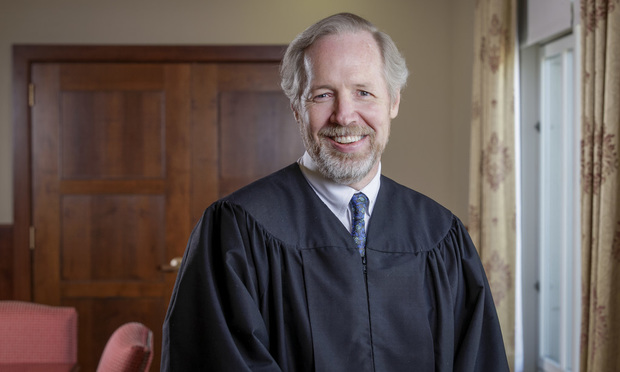Court Rejects Port Authority Worker's Suit Over Working on Jewish Sabbath
“On this record, the religious accommodation offered by the Port Authority was reasonable. And because the blanket exemption proposed by Miller would have imposed more than a de minimis hardship, the employer was not required to accept it,” Judge Kevin McNulty wrote.
November 16, 2018 at 06:09 PM
3 minute read
 U.S. District Judge Kevin McNulty. Photo by Carmen Natale/ALM
U.S. District Judge Kevin McNulty. Photo by Carmen Natale/ALM
A New Jersey federal judge has rejected a civil rights claim filed by a former Port Authority worker who claimed religious discrimination because he was required to work on the Jewish Sabbath, reasoning that accommodating the schedule would violate his union's collective bargaining agreement.
According to the Nov. 13 decision in Miller v. Port Authority of New York & New Jersey, the civil rights case was filed by Gary Miller, who worked for less than three months as a Port Authority of New York and New Jersey employee at Newark Liberty Airport in 2015.
After his termination, Miller sued the Port Authority, claiming religious discrimination and failure to accommodate his religious beliefs in violation of Title VII of the Civil Rights Act of 1964.
As a unionized utility systems maintenance worker, Miller was held to a neutral rotational schedule and was sometimes required to work at times that conflicted with his observance of the Jewish Sabbath, which prohibits work from sunset on Friday to sunset on Saturday.
A few days after starting his new position, Miller requested that he not be required to work shifts that conflicted with the Sabbath and Jewish holidays. Miller claimed his request for an accommodation was rejected, but he did not recall whether anyone from the Port Authority ever spoke to him about his options to use various forms of leave on days of religious obligation, according to the decision.
However, the Port Authority provided evidence that Miller was offered the option to swap shifts with other employees and was told that he could use vacation, personal excused time, or compensatory time, the decision said, noting that Miller did use personal excused time for religious purposes on seven different occasions in January and February 2015.
That March, Miller submitted three separate requests for unpaid leave, which were rejected because he had exhausted his personal excused time. When he failed to report to work, he was marked absent without leave and was subsequently terminated, the court said.
Miller alleged the Port Authority's accommodation was not reasonable and that they could have simply altered the rotation schedule by not scheduling him on Friday evenings or Saturdays.
The Port Authority moved to dismiss Miller's claims on summary judgment, which U.S. District Judge Kevin McNulty of the District of New Jersey granted after concluding that Miller's accommodation request would have violated the union's collective bargaining agreement.
The employees in Miller's unit are unionized and as a result, the Port Authority is bound by a collective bargaining agreement. Creating a permanent shift schedule for Miller exempting him from working on the Sabbath or the Jewish holidays without first offering that option to more senior employees would have violated the agreement's seniority provision, McNulty reasoned in his decision.
“In short, Miller's preferred accommodation would have placed Port Authority in violation of its collective bargaining agreement and required other, more senior employees to work less desirable additional Friday evening and Saturday shifts,” McNulty wrote.
“On this record, the religious accommodation offered by the Port Authority was reasonable. And because the blanket exemption proposed by Miller would have imposed more than a de minimis hardship, the employer was not required to accept it,” McNulty wrote.
Cheryl Alterman, an in-house attorney for the Port Authority who handled the case, declined to comment.
David Zatuchni, a Lambertville attorney who represents Miller, did not return a call for comment.
This content has been archived. It is available through our partners, LexisNexis® and Bloomberg Law.
To view this content, please continue to their sites.
Not a Lexis Subscriber?
Subscribe Now
Not a Bloomberg Law Subscriber?
Subscribe Now
NOT FOR REPRINT
© 2025 ALM Global, LLC, All Rights Reserved. Request academic re-use from www.copyright.com. All other uses, submit a request to [email protected]. For more information visit Asset & Logo Licensing.
You Might Like
View All
Appellate Division Tosses Challenge to Rutgers Board Members That Ensnared NJ Lawyer
5 minute read
On the Move and After Hours: Einhorn Barbarito; Hartmann Doherty; Lowenstein Sandler; Lindabury McCormick
5 minute read

'A More Nuanced Issue': NJ Supreme Court Considers Appellate Rules for Personal Injury Judgments
5 minute readTrending Stories
- 1'A Death Sentence for TikTok'?: Litigators and Experts Weigh Impact of Potential Ban on Creators and Data Privacy
- 2Bribery Case Against Former Lt. Gov. Brian Benjamin Is Dropped
- 3‘Extremely Disturbing’: AI Firms Face Class Action by ‘Taskers’ Exposed to Traumatic Content
- 4State Appeals Court Revives BraunHagey Lawsuit Alleging $4.2M Unlawful Wire to China
- 5Invoking Trump, AG Bonta Reminds Lawyers of Duties to Noncitizens in Plea Dealing
Who Got The Work
J. Brugh Lower of Gibbons has entered an appearance for industrial equipment supplier Devco Corporation in a pending trademark infringement lawsuit. The suit, accusing the defendant of selling knock-off Graco products, was filed Dec. 18 in New Jersey District Court by Rivkin Radler on behalf of Graco Inc. and Graco Minnesota. The case, assigned to U.S. District Judge Zahid N. Quraishi, is 3:24-cv-11294, Graco Inc. et al v. Devco Corporation.
Who Got The Work
Rebecca Maller-Stein and Kent A. Yalowitz of Arnold & Porter Kaye Scholer have entered their appearances for Hanaco Venture Capital and its executives, Lior Prosor and David Frankel, in a pending securities lawsuit. The action, filed on Dec. 24 in New York Southern District Court by Zell, Aron & Co. on behalf of Goldeneye Advisors, accuses the defendants of negligently and fraudulently managing the plaintiff's $1 million investment. The case, assigned to U.S. District Judge Vernon S. Broderick, is 1:24-cv-09918, Goldeneye Advisors, LLC v. Hanaco Venture Capital, Ltd. et al.
Who Got The Work
Attorneys from A&O Shearman has stepped in as defense counsel for Toronto-Dominion Bank and other defendants in a pending securities class action. The suit, filed Dec. 11 in New York Southern District Court by Bleichmar Fonti & Auld, accuses the defendants of concealing the bank's 'pervasive' deficiencies in regards to its compliance with the Bank Secrecy Act and the quality of its anti-money laundering controls. The case, assigned to U.S. District Judge Arun Subramanian, is 1:24-cv-09445, Gonzalez v. The Toronto-Dominion Bank et al.
Who Got The Work
Crown Castle International, a Pennsylvania company providing shared communications infrastructure, has turned to Luke D. Wolf of Gordon Rees Scully Mansukhani to fend off a pending breach-of-contract lawsuit. The court action, filed Nov. 25 in Michigan Eastern District Court by Hooper Hathaway PC on behalf of The Town Residences LLC, accuses Crown Castle of failing to transfer approximately $30,000 in utility payments from T-Mobile in breach of a roof-top lease and assignment agreement. The case, assigned to U.S. District Judge Susan K. Declercq, is 2:24-cv-13131, The Town Residences LLC v. T-Mobile US, Inc. et al.
Who Got The Work
Wilfred P. Coronato and Daniel M. Schwartz of McCarter & English have stepped in as defense counsel to Electrolux Home Products Inc. in a pending product liability lawsuit. The court action, filed Nov. 26 in New York Eastern District Court by Poulos Lopiccolo PC and Nagel Rice LLP on behalf of David Stern, alleges that the defendant's refrigerators’ drawers and shelving repeatedly break and fall apart within months after purchase. The case, assigned to U.S. District Judge Joan M. Azrack, is 2:24-cv-08204, Stern v. Electrolux Home Products, Inc.
Featured Firms
Law Offices of Gary Martin Hays & Associates, P.C.
(470) 294-1674
Law Offices of Mark E. Salomone
(857) 444-6468
Smith & Hassler
(713) 739-1250






